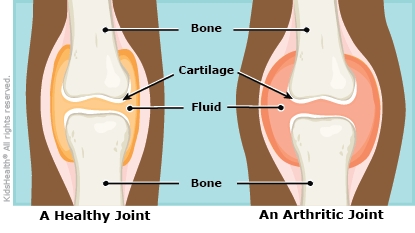Juvenile idiopathic arthritis (JIA) is a group of disorders that causes arthritis (stiff, swollen, painful joints) in children. Often, the disease has times when symptoms go away (called remission) and times when they get worse (called a flare).
Treatments can help with symptoms so children with JIA can live a full and active life.





Are there different kinds of JIA? There are different types of JIA. Each involves different joints. Kids with some types of JIA may have symptoms that include fever, rashes, eye problems, and bowel problems.
What causes JIA? JIA is an autoimmune illness. This means that the body's immune system, which normally attacks germs, mistakenly attacks the joints. This causes inflammation (swelling and irritation) in the joints and other problems.